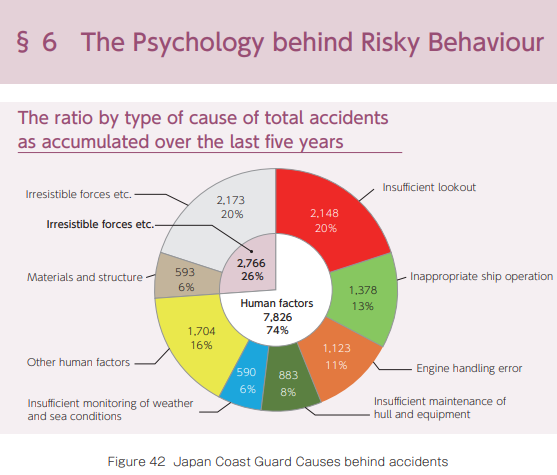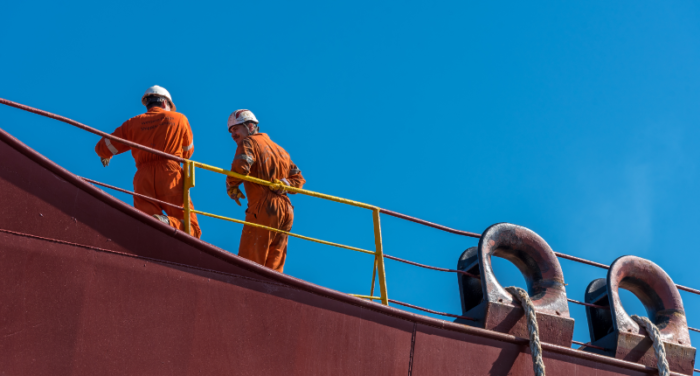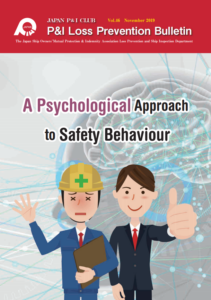Japan P&I Club issued a Loss Prevention bulletin analyzing psychological factors affecting safety behaviour. More than 90% of all maritime accidents are said to be caused by human error. On examining the root cause, in most cases, this was down to inadequate prior inspection and careless mistakes.
As with a car accident that may occur suddenly at a crossing, many are caused by individuals, however, in most cases, this is not the case when it comes to maritime accidents. Rather, it is a chain of human errors that leads to an accident, and unless the error chain is broken, as a result, an accident is sure to occur.
Following further analysis of the accident leads to the recognition that anyone is prone to making a mistake, and that the chain of events that led up to the accident needs to be broken via a method (BRM) that will realise this.
According to a guidebook called “Facts and countermeasures against maritime accidents in 2017 (provisional translation)” issued by the Japan Coast Guard, almost 75% of all maritime accidents are said to be fundamentally caused by human error.

Looking at the chart, irresistible forces are counted as accident causes, however, on analysing the original cause behind them, we can see that almost all are caused by human error.
Thus, 90% of all maritime accidents can be regarded as acts of human error.
Human errors can be mainly classified into the following 4 causes:
- experience,
- environment and work content,
- communication and
- human beings.
In this classification, regarding the human errors caused by experience, environment and work content, and communication they can be prevented relatively easily.
However, for many of those which were caused by a human being, it is difficult to take preventive measures. Depending on the individual situation, what may be considered normal is constantly changing, even when it may be the same person.
In addition, if one tries to forcibly eliminate any of these human causes, psychological reactance, psychology of normalcy bias and/or confirmation bias will come into play (discussed in closer detail below), which may make the situation even worse.
The lecturer considered the ramifications onboard a ship as a result of psychologically unsafe behaviour. The following 5 items are the most dangerous:
1.“Someone will do it for me”
When human beings work with a large number of people, they sometimes take the easy option. This is called “Social loafing” in psychology. Our sense of responsibility is reduced when we feel that a proportion of our workload has been taken care of. In addition, because there is a large number of people with him or her, their anxiety to be evaluated decreases. In order to not cause Social loafing, it is necessary to “clarify the workload and evaluation criteria of each person”.
2. “Stop exaggerating!”
People are unconsciously prone to believe only “what they want to believe” and “information that supports what they believe” rather than purposefully seeking information to the contrary. In addition, when investigating two conflicting opinions, there is a tendency to set a high value on affirmative information, and disvalue or even take no notice of negative information. This is called Confirmation bias.
As a person obsessively collects convenient information that is in line with what he/ she believes to be correct, his/her bias and assumptions are reinforced; with a lack of objectiveness, there is a risk that they may be overlooking correct information.
It is always necessary to have a certain amount of scepticism, no matter how desirable the information, situation or directions may be.
3. “I’m special, nothing can hurt me!”
Human beings have the characteristic to underestimate or ignore information that is inconvenient for him or her. Also, we ignore negative information and underestimate phenomena saying “I’m special, nothing can hurt me!” As a result of this, they missed the chance to escape even though they knew that a disaster was imminent. This is known as Normalcy Bias, justification or cognitive dissonance.
It is important to take the initiative on safety behaviour and it is necessary to eliminate a climate that criticizes or underestimates the people who are taking positive steps
4. “What will the neighbours think?”
Human beings are prone to make a judgement or decision influenced by somebody else’s ideas and thoughts. This is known as the entrainment phenomenon. This is because of our DNA that has stayed with us since ancient times. It tells us we may starve to death if we were to move apart from the group. The lecturer explained to the fishermen why he needed to put on a life jacket, including revisions to the law etc. The reason why life jacket usage has declined is probably because of this entrainment phenomenon.
5. “I won’t do what you tell me”
When being told, “Behave yourself” by your colleagues or “Just do it!” by a family member, we tend to act repulsively, saying “I won’t do what you tell me”. These scenarios are remnant of Psychological reactance.
This is typical psychological behaviour based on instinct which is the guiding principle of human beings: I want to decide and take action by myself. This mechanism is referred to as self-efficacy recovery and/or psychological reactance.
Human beings want to be free originally and do not want to act restricted by anyone. This psychological reactance is highly likely to manifest when being told that you can or cannot doing something by someone who is close to you, on the precondition that the situation and its frequency (depriving your freedom) are closely related.
This psychological reactance is less likely to manifest between a supervisor and his/her subordinate, but is more likely to manifest between colleagues or family members.
Seafarer is an occupation whereby such psychological reactance is prone to manifest due to the following:
- High degree of freedom with limited involvement of the manager.
- Strong confidence and self-consciousness due to a higher education and licenses held.
The publication is part of the Club’s 20th Loss Prevention Seminar titled “A Psychological Approach to Safety Behaviour” which was held in Japan from April to June 2019.
Explore more herebelow:

































































